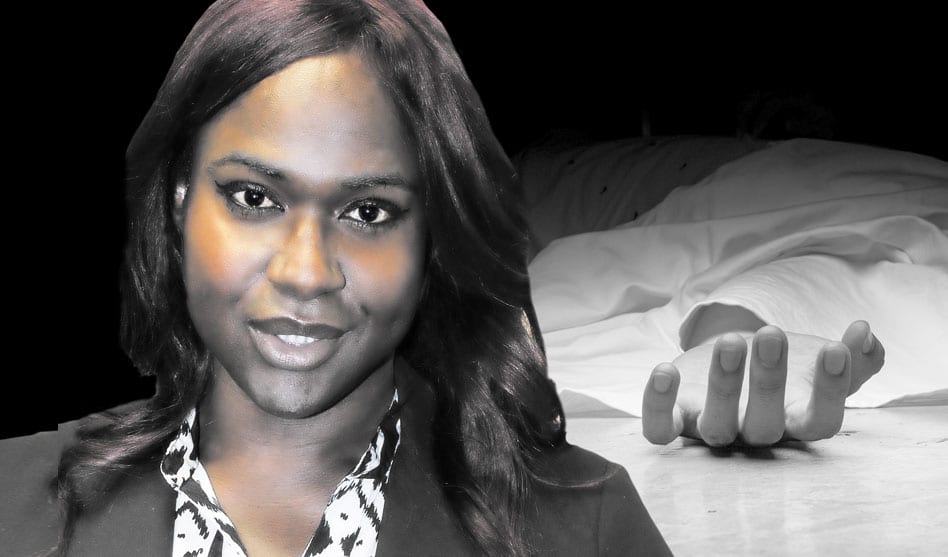Shannon Walker would like to change the climate that’s allowed so many murders of trans women of color
DAVID TAFFET | Senior Staff Writer
taffet@dallasvoice.com
When Dallas trans woman Shade Schuler was murdered, her body found in a field of Record Crossing Road in July 2015, Shannon Walker helped organize a vigil in her memory. Paul Kalburgi attended that vigil, looking for a story he could develop into a play.
Kalburgi started following the case and researching the story. The case went cold, but Kalburgi forged ahead, interviewing trans women of color to learn about their experiences. Among them was Walker.
His play, In the Tall Grass, opens soon at the Bishop Arts Theatre Center. In the meantime, Walker continues her own efforts to change the societal climate that puts trans women, especially trans women of color, at risk. Earlier this year, Walker lost a friend, Chyna Gibson, to anti-transgender violence. That’s when she decided to do something more to help her community.
Since Schuler’s murder, which remains unsolved, Walker said she has been touched by the stories of each trans woman of color who has been murdered. All of the crimes have been horrific, and in those that have been solved, the killers have been men fueled by raging anger.
“The majority of black [trans] women were killed by black men,” she said, adding in speculation, “Insecurity? Extreme passion?” Why, she questioned, would someone be driven to stab another person 30 times?
Many of the murders, Walker said she believes, are crimes of passion, not crimes of hate.
Walker said she decided she had to do something to help. Her goal is to open a resource center providing medical and legal help, employment resources, counseling and seminars — everything, she explained, that a person needs to transition and then lead a successful life.
While she’s not in a position to provide all of that on her own, Walker has begun her project by providing one part of it. Though not an attorney, she knows the steps involved in getting your gender markers changed on official documents and IDs, and the paperwork necessary to accomplish the changes.
So she’s teamed with 2017 Dallas Pride parade grand marshal Nicole O’hara Munro, who raises the money to help others do what Walker said has saved her life.
Walker explains the process and then accompanies trans men and women to the courthouse. Once at the assigned court, she waits outside.
One gender marker change hearing was taking quite a bit of time, so Walker went into the court to see what was going on. Everything was going fine.
The judge was simply taking her time to explain everything that needed to be done and any stumbling blocks that might occur in changing the driver’s license or birth certificate with the state.
When Walker entered the court, the person having their gender markers changed referred to Walker as an attorney. Walker apologized to the judge and explained she was just someone who had gone through the process, understands the importance of having those documents changed and is helping walk others through it.
Walker said the importance of getting documents changed is most obvious in any encounter with police. Before her gender marker change, she said, encounters with police in Dallas were a nightmare.
“They pulled me out of my car and called for a second car,” she recalled, adding that officers taunted and insulted her. But in an encounter after her gender marker was changed, the experience was quite different. It was, she said, a polite exchange.
In addition to walking people through their court experience, Walker has begun doing training seminars. One recent talk was with Dallas probation and parole officers.
“Some just did not want to be there,” she said. “A few were really interested in how to engage with the trans community.”
She also has advice for those in the trans community: “Be honest with someone you’re going to have a relationship with,” she said. “Go out with someone who sees you as a person, not with someone who only sees you at night. This is life or death.”
Walker’s been writing grants to fund some of the other services she would like to provide for the trans community, like medical care and employment assistance, while Munro continues to fundraise to continue what they’ve already been providing. The women know it won’t be easy to reach their goal.
But they also know it’s worth the fight to do it.
This article appeared in the Dallas Voice print edition September 1, 2017.

